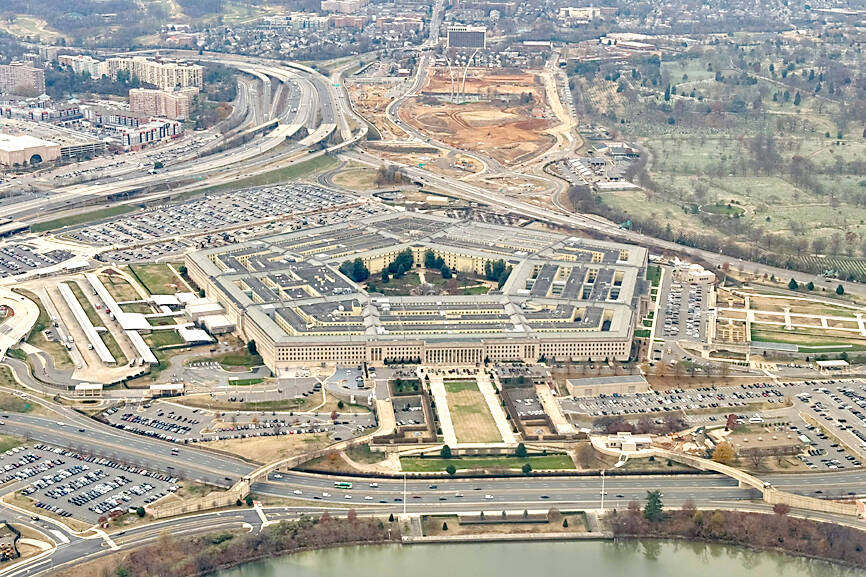China increased its military pressure on Taiwan last year and took other steps in preparation for a potential invasion, an annual report published by the US Department of Defense on Wednesday showed.
“Throughout 2023, Beijing continued to erode longstanding norms in and around Taiwan by employing a range of pressure tactics against Taiwan,” the report said, which is titled “Military and Security Developments Involving the People’s Republic of China (PRC) 2024.”
The Chinese People’s Liberation Army (PLA) “is preparing for a contingency to unify Taiwan with the PRC by force, if perceived as necessary by Beijing, while simultaneously deterring, delaying or denying any third-party intervention on Taiwan’s behalf,” the report said.

Photo: Daniel Slim, AFP
Beijing has “a range of options to coerce Taipei” based on the PLA’s “increasing capabilities in multiple domains,” it said.
These include an air and maritime blockade, military actions, precision missile and airstrikes, the seizure of Taiwan’s small outlying islands and a large-scale amphibious invasion of Taiwan proper, it added.
An amphibious invasion would be “one of the most complicated and difficult military operations for the PLA” and would “likely strain the PRC’s armed forces and invite a strong international response,” but it had conducted “realistic, large-scale” amphibious assault training last year that was “almost certainly aimed at supporting a Taiwan invasion scenario,” the report said.
Although there is no indication that China is expanding its fleet of tank landing ships and medium-sized landing craft at this time, the PLA probably assesses that it already has sufficient amphibious capacity or believes that its shipbuilding capacity can produce the necessary shore-to-shore connectors relatively quickly, it said.
The report also said that China’s navy transferred many of its land-based aircraft, including 300 fighter jets, to its air force last year, so that the navy could “focus on improving carrier-based air operations.”
In addition, the PLA’s rocket force increased its presence along the Taiwan Strait with new missile battalions last year and “is prepared to conduct missile attacks” in an attempt to “degrade Taiwan’s defenses, neutralize Taiwan’s leadership or break the public’s will to fight,” it said.
The report also detailed how Taiwan is “taking steps to address the military threat posed by the PLA,” such as by building war reserve stocks, growing its defense-industrial base, improving joint operations and crisis response capabilities, and strengthening its officer and noncommissioned officer corps.
Minister of National Defense Wellington Koo (顧立雄) yesterday told reporters that “Taiwan has the determination, ability and strength to enhance its self-defense capabilities and deter reckless moves by China.”
China’s military expansion is threatening regional peace and stability, he said, adding that Beijing has aroused concerns in the region and countries in the Indo-Pacific and Europe are holding more military exercises to bolster regional security and avoid conflict in the Taiwan Strait or the Indo-Pacific region.

The US government has signed defense cooperation agreements with Japan and the Philippines to boost the deterrence capabilities of countries in the first island chain, a report by the National Security Bureau (NSB) showed. The main countries on the first island chain include the two nations and Taiwan. The bureau is to present the report at a meeting of the legislature’s Foreign Affairs and National Defense Committee tomorrow. The US military has deployed Typhon missile systems to Japan’s Yamaguchi Prefecture and Zambales province in the Philippines during their joint military exercises. It has also installed NMESIS anti-ship systems in Japan’s Okinawa

‘WIN-WIN’: The Philippines, and central and eastern European countries are important potential drone cooperation partners, Minister of Foreign Affairs Lin Chia-lung said Minister of Foreign Affairs Lin Chia-lung (林佳龍) in an interview published yesterday confirmed that there are joint ventures between Taiwan and Poland in the drone industry. Lin made the remark in an exclusive interview with the Chinese-language Liberty Times (the Taipei Times’ sister paper). The government-backed Taiwan Excellence Drone International Business Opportunities Alliance and the Polish Chamber of Unmanned Systems on Wednesday last week signed a memorandum of understanding in Poland to develop a “non-China” supply chain for drones and work together on key technologies. Asked if Taiwan prioritized Poland among central and eastern European countries in drone collaboration, Lin

The Chien Feng IV (勁蜂, Mighty Hornet) loitering munition is on track to enter flight tests next month in connection with potential adoption by Taiwanese and US armed forces, a government source said yesterday. The kamikaze drone, which boasts a range of 1,000km, debuted at the Taipei Aerospace and Defense Technology Exhibition in September, the official said on condition of anonymity. The Chungshan Institute of Science and Technology and US-based Kratos Defense jointly developed the platform by leveraging the engine and airframe of the latter’s MQM-178 Firejet target drone, they said. The uncrewed aerial vehicle is designed to utilize an artificial intelligence computer

Renewed border fighting between Thailand and Cambodia showed no signs of abating yesterday, leaving hundreds of thousands of displaced people in both countries living in strained conditions as more flooded into temporary shelters. Reporters on the Thai side of the border heard sounds of outgoing, indirect fire yesterday. About 400,000 people have been evacuated from affected areas in Thailand and about 700 schools closed while fighting was ongoing in four border provinces, said Thai Rear Admiral Surasant Kongsiri, a spokesman for the military. Cambodia evacuated more than 127,000 villagers and closed hundreds of schools, the Thai Ministry of Defense said. Thailand’s military announced that